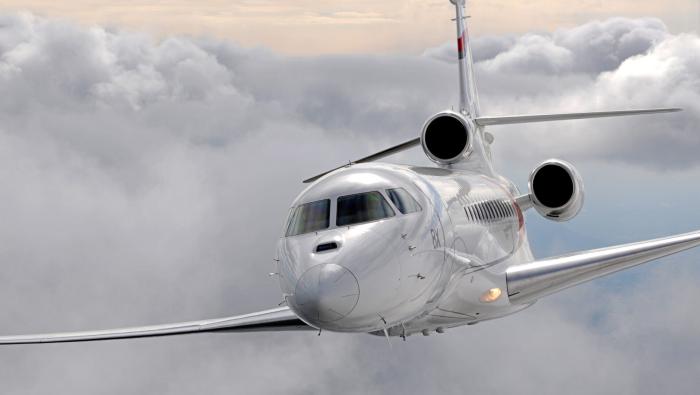Dassault Aviation has focused on ramping its production lines back up after a short suspension to accommodate new health and safety measures and, despite the ongoing uncertainties surrounding Covid-19, is working to keep its Falcon 6X program on track with first flight still anticipated next year, according to a senior company executive.
Carlos Brana, Dassault’s executive v-p of civil aircraft, said the restart of production—which halted in mid-March for a few weeks—has gone smoothly and the company’s priority is to “emerge from this crisis in a strong position.”

This includes sustaining the company’s research development and new programs. “We have a lot of development activity going on,” said Brana, who took over responsibility for the French manufacturer’s civil aviation programs last year after holding several positions with the company, including senior v-p for Dassault Falcon Jet operations.
Dassault is focused on moving ahead with work on Falcon 6X pre-production aircraft, he added. “We have commitments to customers that we intend to honor. As previously announced, first flight will happen early next year.” Dassault took the wraps off the 5,500-nm 6X twinjet in early 2018 with plans to bring it to market in 2022.
Research and development activity is pushing forward for programs beyond the 6X, Brana noted. “We have some interesting things in the pipeline, too, including an all-new Falcon model and new safety, comfort, and health features,” he said. “I frankly think our competitors’ eyeballs will pop out when they see what’s coming.”
Dassault has not yet revealed plans for its “future Falcon,” but chairman and CEO Eric Trappier said in February those details would be unveiled later this year.
Near term, though, Dassault Falcon is taking measures to get its customer aircraft delivered. “We have adapted our delivery process to this new environment and, in parallel, have maintained our support to customer operations,” he said. This includes dispatching Falcon go teams and airborne support aircraft when and where needed and maintaining operations at service centers, spares facilities, and other support centers.
“We’re continuing the adaptation of our greatly expanded service center network—our acquisitions from TAG Aviation and ExecuJet,” Brana said. With those acquisitions, both completed over the past 18 months, Dassault now has an owned service center network spanning 34 locations around the world, in addition to authorized centers.
As is typical during market slowdowns, he is anticipating a dip in new sales, but observed, “We’ve adjusted to circumstances before.” Beyond a softening of demand, the pandemic, and restrictions surrounding it, is presenting obstacles to sales efforts. “Imagine how frustrated our salespeople must be! These are people who love to be in the CEO’s office or showing an aircraft at an airshow—or even better, taking a customer on a demo flight.”
Encouragingly, interest has been strong for Dassault preowned aircraft, Brana said. “There is a certain segment of the market that is looking for quality aircraft that can be put into service quickly.”
The company also is benefiting from a “deeply committed investor base,” including the Dassault family itself, he said, noting that the children of Serge Dassault—Olivier, Laurent, Thierry, and Marie-Hélène—wrote employees reassuring that the company would get through the tests of the pandemic and “emerge even stronger.” They’ve also declined their 2019 dividend to preserve cash, he said. “The family’s emotional and financial commitment gives us great confidence.”
Dassault also is in a stronger position after stabilizing the military side, he said. “We delivered 26 Rafale fighters last year—our best year ever."
But as far as what might happen moving forward, Brana is less certain. “I wish I had a crystal ball for the next two years. So much will depend on the ability of global markets to operate in the absence of therapeutics and a vaccine,” he said. “We just have to assume that demand will remain soft for the time being, but as restrictions are lifted, markets will begin recovering.”
Brana does believe that the pandemic will leave a more lasting mark on transportation, though. “I think at every stratum of society we’re going to be more thoughtful about how we use transportation,” he explained. “People aren’t going to abandon aviation. But business jet operators will place a higher priority on efficiency and productivity. That won’t be a bad thing for Dassault, which has long focused on operating efficiency.”
He believes the crisis could also help forward areas such as expansion in biofuel use. “If we can work together to create economies of scale, biofuels will become more competitively priced, just as wind and solar now compete with fossil fuels,” he said. “One thing we will learn from the current situation is that we can accomplish great things and tackle big problems through collective action.”
For Brana, Covid-19 has been “an up-close and personal experience.” He had a relatively early and mild case, he said, keeping him at home with it for three weeks. But he said he is recovered and his family is fine as well.
“It’s not easy to lead and to manage from home; I naturally prefer to be face-to-face,” he said, adding that technology makes it possible. “It’s when a crisis happens that your team is truly tested.” Dassault teams have worked with cohesion, and morale has remained high as people have adjusted to working from home and with new precautions, he said.
“There are a lot of reasons for optimism. The solidarity we see between people, and certainly within Dassault, and between Dassault and the communities we serve,” according to Brana.
This includes assisting in the relief efforts, furnishing aircraft and crews to help fly healthcare providers and donating €2 million to hospital operations. Brana also credited the efforts of Dassault customers, citing one who bought respirators in Taiwan and flew them to Europe in his own Falcon 7X. “I think it’s fair to say we’re seeing a whole new set of heroes,” he said.







